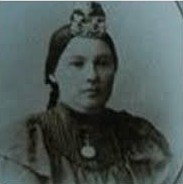
Mukhlisa Bubi (Nigmatullina) was religious figure and teacher.
She was born on March 6 (February 21), 1869 in Izh-Bubi village, Sarapul district, Vyatka province, in the family of mullah. She is the sister of Gabdulla and Gubaidulla Bubi.
She studied in the madrasah of her native village. In 1901, Mukhlisa Bubi, together with her brothers and their wives, established a six-year Tatar women’s school in Izh-Bubi village and became its director. Along with the religious disciplines, various secular disciplines were also taught in the madrasah, and they started teaching the Russian language since 1905. In 1907, a one-class female Russian-Tatar school was opened at the expense of the Sarapul district zemstvo, which became an integral part of the female madrasah. In 1907, the Sarapul School Council granted permission to take exams for the title of a teacher (mugallima) of an elementary Tatar school and issue certificates to people who passed these exams. The madrasah became the first educational institution that trained female teachers for women’s madrasahs and kuttabs. After the destruction of the men’s madrasah and the arrest of the Bubi brothers in 1911, the women’s school was also closed in 1912. Mukhlisa Bubi moved to the city of Troitsk, Orenburg province, where she directed the elementary women’s school opened in 1910. At the same time, she taught the doctrine of faith in a women’s gymnasium since 1913. In 1914, with the help of the merchants Yaushevs, Bubi managed to open a women’s madrasah. In 1915, she also succeeded to open a women’s teacher’s seminary.
At the First All-Russian Muslim Congress (Moscow, May 1–10, 1917), she was elected a member of the Spiritual Board of Muslims and qadi. Since 1917, she worked in Ufa, headed the department of family affairs of the Spiritual Board, was engaged in maintaining registers of births, regulating family affairs, working on converting to Islam, etc. Bubi also did a lot of organizational and educational work among women, delivered articles in the newspapers Ulfat, Akhbar, Wakyt, in the magazines Syuyumbike, Islam mazhallyase, in which she covered the role of women in the family and society and the challenges facing her, she paid special attention to the fact that the main duty of a woman is to preserve language, national and religious traditions.
On November 20, 1937, she was arrested on charges of participating in the counter-revolutionary insurgent nationalist organization of Bashkiria and sentenced to the firing squad (December 23, 1937). She was rehabilitated posthumously in 1960.
